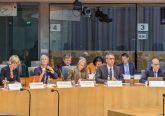 David Cameron took office having pledged during his campaign to reduce net migration to the “tens of thousands rather than hundreds of thousands,” a commitment that has been reiterated numerous times since then by Cameron and other Conservative ministers (although it is technically a Conservative party goal rather than a coalition government policy). But reducing migration appears much easier said than done. The coalition government has put forward policies designed to reduce net migration through limitations on international students and skilled labour migrants. It has opened a consultation on policy toward settlement—the granting of indefinite leave to remain in the UK, as opposed to mere temporary resident status—and it plans to address marriage- or family-related migration soon.
David Cameron took office having pledged during his campaign to reduce net migration to the “tens of thousands rather than hundreds of thousands,” a commitment that has been reiterated numerous times since then by Cameron and other Conservative ministers (although it is technically a Conservative party goal rather than a coalition government policy). But reducing migration appears much easier said than done. The coalition government has put forward policies designed to reduce net migration through limitations on international students and skilled labour migrants. It has opened a consultation on policy toward settlement—the granting of indefinite leave to remain in the UK, as opposed to mere temporary resident status—and it plans to address marriage- or family-related migration soon.
My colleagues at the Migration Observatory and I have assessed the policies on offer to date, and concluded that they are not on course to meet the pledged target of “tens of thousands.” In fact, the government appears on course for only about half of the reduction it needs to meet its goal, even granting their own, admittedly uncertain, assessments of the impact of their policies.
First, the mechanics of the shortfall: the government needs to reduce net migration by more than 142,000 per year from current levels to meet its goal of “the tens of thousands.” Proposed policies aim to reduce net migration mainly by limiting three types of migration inflows non-EU nationals—work, study and family—and by increasing outflows by making it more difficult for non-EU nationals to gain the right to reside permanently in the UK.
But settlement policy cannot be expected to have significant impact within the duration of this Parliament, since it affects people’s rights to remain in the UK after five years’ stay, and will not apply retrospectively to migrants already here prior to April 2011. Family migration policy is unlikely to mean reductions of more than 8,000 or so net migrants per year, according to our admittedly approximate estimates at the Migration Observatory. (Aside from dependents of work and student migrants, there are relatively few family migrants who might be targeted by changes to this route, and there are significant legal constraints on impeding the rights of citizens to be with their spouses or children.) And reforms to the work and study tiers of the Points-Based System have been estimated by government impact assessments to yield reductions in net migration smaller than required if they are to bear a proportionate share of a reduction in net migration large enough to meet the numerical goal. (For Observatory estimates, see http://www.migrationobservatory.ox.ac.uk/commentary/target-government-policies-are-not-track-reducing-net-migration-tens-thousands-2015.)
But, mechanics aside, what explains the government’s shortfall on a key commitment? This is not a case of a campaign pledge relegated to the dustbin as soon as it is politically convenient; far from it, the government has reiterated its commitment to its numerical goal, and has undertaken significant policy changes toward that end. So what happened?
First, net migration includes several types of “flows” that government has little or no ability to control. The movement of British nationals counts in net migration. Yet clearly the government does not constrain the migration choices of its own citizens. The same is true of EU nationals (more precisely, EEA and Swiss nationals), whose free movement across borders is fundamental to the very notion of European Union. In 2009, an estimated 167,000 EU nationals arrived in the UK as migrants; net migration among EU nationals was estimated at 58,000.
Additionally, international law and commitments require the acceptance (or at least non-return) of people seeking asylum (at least until the validity of their claim can be determined), and, as noted above, family migrants have strong claims on human rights grounds as well.
The pledge to reduce net migration to the tens of thousands therefore involves aiming at a stationary target, but from a moving platform. Net migration has been rising even as the coalition government took office and began to discuss new policies; estimates of net migration have risen from 198,000 in 2009 to 242,000 in the year to September 2010. Indeed, although net migration is negative among British nationals, recent increases in net migration tallies have been attributed largely to decreases in the number of British citizens emigrating.
In addition, migration is driven not only by a “supply” of migrants wishing to come to Britain, but also by “demand” for migrants, particularly workers and students. As Martin Ruhs and Bridget Anderson have argued in their volume Who Needs Migrant Workers?, sectors of the British economy such as construction and social care need more fundamental changes—to the way work is organized, to the way workers are trained, to pay scales and working conditions, among other factors—in order to reduce their reliance on migrant labour. And universities and other educational institutions depend heavily on international students for (higher) fees as well as for their less-easily monetized contributions to research (particularly postgraduates in science and related fields) and to the educational environment. As long as these dependencies or incentive structures remain as they are, barring non-EU migrants may open the door to increases in EU migration.
Moreover, as should be familiar to many political scientists, “path dependence” appears to have created feedback loops in policy systems that make changing migration policy more difficult. Employers responded to the government’s consultation on changes to skilled labour migration (Tiers 1 and 2 of the Points-Based System) with vigorous arguments for the economic necessity of IntraCompany Transfers (ICTs)—individuals relocated by their employers from overseas branches to British branches of the same company. Universities responded to the consultation on student migration with equally vigorous arguments for the economic and other benefits that international students bring. Both groups had success on these fronts, though they did not get everything they wanted; ICTs and university students are wholly or largely exempt from new migration restrictions. Is this a sign of admirable responsiveness to sound arguments, or of the power of organized interests to outweigh democratic preferences in the policy process? Judgement here surely depends on one’s perspective and values.
Dr Scott Blinder is a senior researcher at Oxford’s Centre on Migration, Policy and Society (COMPAS) and the Migration Observatory (http://www.migrationobservatory.ox.ac.uk), and an associate member of the Department of Politics and International Relations.





1 Comment
A very good read for the lay person and easy to understand. Thank you